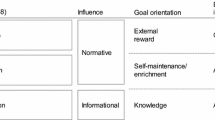Abstract
Evaluation of IT with end users is necessary to create systems that provide real benefit to society. Usually, evaluation is considered only as a trial of technology with users simply responding to questionnaires. Nevertheless, the process implies many aspects that should not be overlooked. In this paper we present a detailed framework that attempts to present all the mandatory and advisable issues that should be addressed in an evaluation of IT with users. This framework is valid for laboratory tests, and is also specifically recommended for social scenarios; for example day centers, user’s dwellings, etc. This framework is being used in a European project where hundreds of users test technology in different scenarios.
Access this chapter
Tax calculation will be finalised at checkout
Purchases are for personal use only
Preview
Unable to display preview. Download preview PDF.
Similar content being viewed by others
References
Ballantine, J.A., Galliers, R.D., Stray, S.J.: Information systems/technology evaluation practices: evidence from UK organizations. Journal of Information Technology 11, 129–141
Demers, L., Monette, M., Lapierre, Y., Arnold, D.L., Wolfson, C.: Reliability, validity, and applicability of the Quebec User Evaluation of Satisfaction with Assistive Technology (QUEST 2.0) for adults with multiple sclerosis. Disability and Rehabilitation 24, 21–30 (2002)
Day, H., Jutai, J., Campbell, K.: Development of a scale to measure the psychosocial impact of assistive devices: lessons learned and the road ahead. Disability and Rehabilitation 24, 31–37 (2002)
Goodman, G., Tiene, D., Luft, P.: Adoption of assistive technology for computer access among college students with disabilities. Disability and Rehabilitation 24, 80–92 (2002)
Shone, S.M., Ryan, S., Rigby, P.J., Jutai, J.W.: Toward a comprehensive evaluation of the impact of electronic aids to daily living: evaluation of consumer satisfaction. Disability and Rehabilitation 24, 115–125 (2002)
Scherer, J., Cushman, L.A.: Measuring subjective quality of life following spinal cord injury: a validation study of the assistive technology device predisposition assessment. Disability and Rehabilitation 23, 387–393 (2001)
World Medical Association, Declaration Of Helsinki about Ethical Principles for Medical Research Involving Human Subjects. Last revision (2004)
Author information
Authors and Affiliations
Editor information
Rights and permissions
Copyright information
© 2008 Springer-Verlag Berlin Heidelberg
About this paper
Cite this paper
Vaquerizo, E., Garrido, Y., Falcó, J., Skehan, T., Jiménez, A., Casas, R. (2008). Step by Step Framework for Evaluation of In-Formation Technology Benefit in Social Scenarios. In: Lytras, M.D., et al. The Open Knowlege Society. A Computer Science and Information Systems Manifesto. WSKS 2008. Communications in Computer and Information Science, vol 19. Springer, Berlin, Heidelberg. https://doi.org/10.1007/978-3-540-87783-7_3
Download citation
DOI: https://doi.org/10.1007/978-3-540-87783-7_3
Publisher Name: Springer, Berlin, Heidelberg
Print ISBN: 978-3-540-87782-0
Online ISBN: 978-3-540-87783-7
eBook Packages: Computer ScienceComputer Science (R0)




